- Home
- Amelia C. Adams
Tabitha_Bride of Missouri
Tabitha_Bride of Missouri Read online
Tabitha: Bride of Missouri
by Amelia C. Adams
To my fantastic fans—your encouragement means more to me than you will ever know.
***
I’m so grateful for my beta readers—Bobbie Sue, Cissie, Erin, Jennifer, Mary, Tracy H., Tracy L., and my husband—you are all wonderful! And to my street team—you’re the best cheerleaders ever.
Table of Contents:
Chapter One
Chapter Two
Chapter Three
Chapter Four
Chapter Five
Chapter Six
Chapter Seven
Chapter Eight
Chapter Nine
Chapter Ten
Chapter Eleven
Chapter Twelve
Chapter Thirteen
Chapter Fourteen
Chapter Fifteen
Chapter Sixteen
Chapter One
Atwater, Missouri
September 1890
Tabitha Phillips stepped off the train in Atwater, Missouri, and looked around. Once upon a time, she’d told herself she’d never come back here, but that wasn’t the way fate had chosen to deal its hand. After two years of living on her own and taking care of herself, now she would have to rely on her relatives again—relatives she didn’t like, and who didn’t like her.
It wasn’t that Clara and Herbert Wilcox were bad people—no, they were the cream of the crop, the salt of the earth, and the pillars of their community. But Clara had always thought of her young cousin as a burden, and while she had taken Tabitha in out of Christian charity, she had never enjoyed the task. Chances were, she wouldn’t enjoy it this time, either.
The textile mill in Massachusetts had been an excellent place for Tabitha to work. The owner had always seemed odd, but Roberta, her manager, had been a fair and kind person, and grew to become one of Tabitha’s friends. She had bonded with Hope, Trinity, Lilly, and Isabella, the girls who worked alongside her, and she was happy living in a small boardinghouse. Her life hadn’t been elegant by any means, but it had been her own. With the fire that destroyed the mill, that independent life had been destroyed as well.
“Tabitha? Little Tabitha, is that you?”
With a smile pasted on her face, Tabitha turned to greet the older woman who had bustled up behind her on the train platform. “Hello, Mrs. Smith. It’s good to see you again.”
The woman tsked her tongue. “Look at you, all grown up. I almost didn’t recognize you, but then I thought to myself, that has to be Tabitha. No one else has such pretty hair. And sure enough, it is you! Why, I’m so glad you’ve come back. Our little town has missed you! In fact, I’m quite positive I know of several young men who have especially missed you.” She winked as though revealing a tremendous secret.
Tabitha didn’t want to hear about the young men. Before she left two years previously, it had been nothing but a long string of boys on the doorstep, and none of them could hold a decent conversation. One of them was annoyed that Clara didn’t keep a spittoon in the parlor, and another had the most irritating habit of constantly polishing his spectacles. No, the young men of Atwater didn’t hold Tabitha’s interest in the slightest, but that was all right. She wasn’t interested in marriage at this point in her life. If she were, maybe she would have become a mail-order bride, like her friends from the mill.
“So, you’ll be working at the post office with Clara, then?” Mrs. Smith went on. “I always thought you were especially good at it. Why, you could make something as mundane as sending a letter downright exciting!” She hooked her elbow through Tabitha’s confidingly and winked, her short eyelashes barely brushing her cheeks. “And I just know the young men will feel the same way!”
Tabitha needed to put an end to this immediately before the woman started filling out a dance card for her. “Mrs. Smith, I should let you in on a secret,” she said, patting the hand that lay on her arm. “I’m not interested in courting right now.”
Mrs. Smith blinked several times. “Not interested in courting? But my dear, you’re . . . let’s see. You’d be twenty by now, wouldn’t you? Isn’t it high time you found yourself a husband? I read the most interesting article the other day. It seems that frogs can live from ten to twelve years. Now, that’s quite good for an animal, but imagine—if we as humans only lived that long, we’d have to take getting married a lot more seriously! We wouldn’t have time to waste!”
Tabitha opened her mouth, but no words would come out. “Frogs?” she finally managed.
Mrs. Smith nodded vigorously. “That’s right. Fascinating, isn’t it? So, tell me, dear. Why this delay? You aren’t ill, are you?” She leaned in and whispered, “You don’t have some sort of deadly disease?”
“Oh, no, I’m fine.” Tabitha smiled, trying to look reassuring, but she was still rather startled by the mention of frogs. It had been so long since she’d seen Mrs. Smith that she’d all but forgotten that woman’s ability to ramble on about the strangest things in the world. “I just need a little time to decide what to do next. Losing my job in Massachusetts came as rather a shock, and I’m at a loss.”
“Sometimes fate is like a slingshot and snaps us in the behind when we need to get a move on,” Mrs. Smith said with a giggle. “Who’s to say that you aren’t supposed to be right here in Atwater? Maybe losing your job was a blessing in disguise to bring you home.”
“I don’t know. I suppose it might be,” Tabitha replied, although she’d never considered Atwater her home, and couldn’t imagine doing it now.
“I have just the cure for you, young lady. What you need is a kiss.”
Tabitha blinked. “I . . . beg your pardon?”
“A kiss! Surely you know what a kiss is.”
“Of course I do, but how would a kiss solve my problem?”
Mrs. Smith shook her head. “I can see that this is going to take a lot more work than I thought. You start by finding a tall, strapping fellow, maybe one with blue eyes, and then you let him plant a kiss on you. If that doesn’t cure what ails you, well, you’ve got one foot in the grave and there’s nothing to be done with you.”
Tabitha chuckled. “It’s always going to come right back to courting, isn’t it, Mrs. Smith? But what if that’s not what I need? Surely it can’t be the answer to everything.”
Mrs. Smith gave her a knowing look. “I rather think it is. I’ll make you a bargain, missy. You go find one of those men, you get one of those kisses, and you see for yourself just what magic it can do. And if it doesn’t work, come tell me.”
“And just where do I find one of those men, Mrs. Smith? I already know all the boys in town.”
“You’ve been gone for two years! You don’t think everything here stayed the same while you were gone, do you? Dear me, no. We have a lumber yard now, some new ranches on the outskirts of town, and more trains coming through than ever. We’ve restocked our man pool, dear, and it’s time you went fishing. Now, I’ve kept you too long. Be on your way, or Clara will have my hide for keeping you.”
Tabitha hid her amusement until Mrs. Smith was out of sight. Then she smiled and shook her head. Oh, gracious.
She needed to ask the station manager to have her trunk delivered to the post office. Spinning on her heel to go do just that, she stopped abruptly when she collided with a young man who had been crossing the platform behind her. He reached out and steadied her shoulders before she could topple over.
“Oh, I’m so sorry,” she gasped. “I should have been watching where I was going.”
He chuckled. “No harm done, miss.”
His voice was warm and mellow, and when she looked up, her breath caught. What had she just been saying to Mrs. Smith about not being interested in
romance? That all seemed very silly now. This young man was possibly the most handsome one she’d ever seen. He had dark, wavy hair, green eyes, and a little dimple in his cheek. He was grinning at her, and she nearly forgot her name.
“Are you all right?” he asked.
“Oh. Oh, yes, I’m quite all right. Thank you.”
He dropped his hands from her shoulders and took a step back. “Have a good day,” he said, touching the brim of his cap before moving off into the crowd. She watched him as he approached the train and began pulling logs off one of the freight cars. He must work at the lumber mill.
After a moment, she pulled herself back to reality and spoke to the station master about her trunk, then picked up her skirts and began her walk to the post office. It wasn’t far from the train station—just far enough to gather her thoughts and practice saying hello to her cousin.
Should she be light and breezy? Or perhaps humble and penitent? Oh, what was the use—Clara would be unhappy to see her regardless. Tabitha didn’t know why she tried as hard as she did to win her cousin’s approval. It was a wasted effort.
Up ahead, she saw Clara sitting in her rocking chair on the front porch of the post office. They must be having a slow afternoon—Tabitha wouldn’t let herself think that her cousin might have been glad to get her telegram and would actually be waiting to welcome her. She glanced down at the dirt road beneath her feet, hoping she wasn’t kicking too much of the dust up onto her petticoats. She wanted to make the best possible impression after being away for so long.
“So, you’ve come back,” Clara said as Tabitha climbed the steps of the porch. “Couldn’t make a go of it back east, eh?”
“Hello, Clara. It’s good to see you.” Tabitha took in the woman’s knitted shawl, lined face, cotton dress—it seemed as though time had stood still here in Atwater. “Yes, the mill where I was working burned down.”
Clara shook her head. “I always thought it was foolish, chasing off after some crazy dream like that. Maybe now you’ll see for yourself. Life isn’t all about silver buttons and fancy doodads.”
Tabitha’s dress did have silver buttons on it, but she hardly considered them fancy doodads. She forced a smile onto her face. “Where’s Herbert?”
“Getting the mail from the train. It’s what we do here, if you recall. Or maybe you’ve been gone too long and forgot.” Clara dug the toes of her shoes into the floor of the porch and began rocking again, back and forth, slow and rhythmic. “Your room’s right where you left it.”
“Thank you, Clara. It’s good to be back.” Tabitha managed another smile before entering the post office and slipping through the door that separated the business from the living quarters. That had gone just about as well as she had expected.
She went up the stairs, noticing that the pictures that hung along the wall as she climbed hadn’t been changed. There was the painting her mother had done when she was twelve—a simple thing, showing an apple tree with a flock of geese under it. The geese almost looked more like small dogs, but this was one of her mother’s first attempts, so Tabitha supposed she shouldn’t be too critical.
A few steps up brought her to eye level with a photograph of her grandparents that was taken a year or two before her grandfather passed from a heart condition, his wife to follow six months later from consumption. The two looked very solemn in the picture, but Tabitha remembered them as kind and fun-loving people who put their hearts into raising their two daughters, Tabitha’s mother and Clara’s mother. As she crested the last stair, she wondered—not for the first time—what had happened in Clara’s life to make her so bitter.
A right turn at the head of the stairs brought Tabitha to the doorway of her old room. She paused, giving herself a moment before stepping back in time. She had first come to this room as a ten-year-old orphan, unable to understand why her parents were suddenly gone and why Clara must now raise her. The words “carriage accident” and “into the river” didn’t sink in for weeks—she refused to believe it because it was too horrible.
She crossed the room and touched the pink-and-white quilt that had been on her bed the first time she ever entered this room. It was a bit faded, but comforting and familiar. She remembered crying herself to sleep under this quilt far too many times, clutching the corner of it to her chest.
There was the window seat where she used to sit and watch the boys pass back and forth down below on the street. There was only one boy in town she cared anything about—Benjamin Brocklehurst—and her heart would skip a beat whenever she saw him coming. There was something so suave about the way he walked, something that made all the girls look. His dark brown hair swooped across his forehead like a bird’s wing, and his hazel eyes sparkled. But he never paid any attention to Tabitha whatsoever, and then his family moved to St. Louis. She had cried herself to sleep that night, too.
Tabitha chuckled. Gracious—all these sad memories. There was no need to be so gloomy; she had plenty of happy memories here too. Those might be a little harder to dredge up, but she’d find them. She wasn’t going to be a slave to her past. She had learned to be happy while in Massachusetts, and she would find some joy here in Missouri, too.
Just then, she heard men’s voices coming from downstairs. “You can bring it this way.”
Her trunk must have arrived from the train station. She walked over to the doorway to see Frank Giles hefting it up the stairs, his face turning red from the exertion. For some reason, Herbert wasn’t helping him, but was standing in the hallway like a landmark.
“Thank you, Frank,” Tabitha said as he set the trunk in her room. She tried to hand him a tip, but he waved it off.
“Glad to have you back in town, Tabitha.” He paused. “Although, with you so grown up now, maybe I should be calling you Miss Phillips.”
She laughed. “Oh, please no. We’re friends, and that’s how it shall always be. Calling me ‘miss’ would make me feel like a stranger.”
“Well, how about this—I call you Tabitha, and you stop trying to tip me. Friends carry things for friends, don’t they?” He raised an eyebrow.
“You’re right, and I’m sorry. I just didn’t want to presume . . .”
He waved again. “Never you mind. So, have you heard about the fall festival?”
Tabitha shook her head. “What’s that?”
“Well, this next Saturday night, there’s gonna be a dance and a dinner in the town square, and they’re gonna crown a Miss Atwater. Now that you’re back in town, you’re a shoo-in.”
“Miss Atwater? What on earth is that?”
Frank pulled off his hat and scratched his head. “You know—a young lady chosen to
represent the town.”
Tabitha chuckled again. “No, I don’t think I’d be interested. It’s a flattering thought, though.”
“You should definitely come to the festival anyway. There’s a pie-making contest, and a quilt contest—why, it’s like a whole little fair right here in town. The ladies at the church cooked up the idea as a fundraiser for a new roof for the schoolhouse.”
Tabitha looked over at Herbert, who was standing in the doorway without saying a word. “Hello, Herbert. I imagine Clara will be making her famous pecan pie for the contest?”
“I suppose so. She hasn’t really said.”
“Well, I for one think she should—it’s the best pie I’ve ever tasted.” Tabitha turned back to Frank. “I’ll be there. I doubt I’ll enter any of the contests, but it sounds like fun.”
He bobbed his head. “We’ll see you there, then. Afternoon, Herbert.”
After both men had retreated down the stairs, Tabitha opened her trunk and began putting her things away. It was sad in a way that her entire life could be fit into one medium-sized chest.
***
Tabitha hurried downstairs when she heard the sound of pots and pans banging together. “May I help you, Clara?”
“Just making some chicken and corn. Not hard.”
“Then I’ll set th
e table.” Tabitha pulled some plates from the cupboard, then grabbed the silverware.
“Set an extra place. Pastor’s coming.”
“Pastor Gray?”
“No, a new fellow. Name’s Reed.”
Tabitha wished her cousin chatted more. Trying to get information from her was like milking a turnip. “Is he a good preacher?”
“Seems to be. Herbert doesn’t fall asleep in church as much.”
“That’s a positive sign.” Tabitha smiled at Clara as she passed, but Clara didn’t respond. Not that Tabitha had thought she would.
There was a twenty-year age difference between the two cousins. Tabitha knew Clara hadn’t expected to take on the care of an orphan at the age of thirty—after all, things like that never are planned. She also knew that Clara bitterly resented never being able to have children of her own. Some women would have lavished that love on other children, but Clara had turned inward, not allowing her feelings to show, and Tabitha assumed that’s why they’d never been close.
“Tell me all the news from while I’ve been gone,” Tabitha said, trying to lighten the mood in the room.
“Not much to tell. We got a new lumber mill.” Clara dropped the chicken into the frying pan, and it sizzled. Within minutes, the air would be filled with the delicious smell.
“Mrs. Smith was at the station when I got here, and she mentioned something about that.” Tabitha took four glasses from the cupboard and set them on the table. “Has that brought many new families to town?”
“Some. Only know them through the post office.”
“And do they seem nice?”
Clara shrugged. “Haven’t really gotten to talking with them.”
Well, that was certainly no surprise. Tabitha looked over the table and didn’t see anything missing. “Did you want something else on here?”
Clara tossed a quick glance over her shoulder. “Looks fine. Go wash up for dinner.”
Tabitha nearly replied that she wasn’t ten anymore, but pressed her lips together instead. Clara would probably see her as a child for a long time to come, and Tabitha should just be grateful to have family in her life at all. She went back upstairs and washed her hands and face, then decided to brush out her hair and braid it again. That was one thing she detested about train travel—the dust did have a way of settling everywhere.

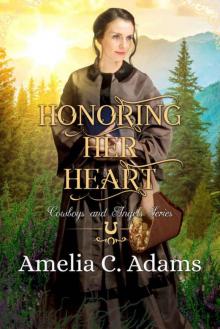 Honoring Her Heart
Honoring Her Heart Buttons and Bows
Buttons and Bows An Agent for Emily
An Agent for Emily Christmas Catch-Up VIII (River's End Ranch)
Christmas Catch-Up VIII (River's End Ranch) A Rancher for Rowena
A Rancher for Rowena Candice (Seven Sisters Book 6)
Candice (Seven Sisters Book 6) Butterfly Kisses
Butterfly Kisses A Stitch in Time
A Stitch in Time Buttons and Bows (The Sewing Circle Book 3)
Buttons and Bows (The Sewing Circle Book 3) Sidearms and Songbirds (Hearts of Nashville Book 3)
Sidearms and Songbirds (Hearts of Nashville Book 3) Herd to Breathe
Herd to Breathe The Ties That Bind
The Ties That Bind Rhyme or Reason
Rhyme or Reason Revelations (Brody Hotel Book 4)
Revelations (Brody Hotel Book 4) Phoebe's Fate (Burnt River Contemporary Western Romance Book 9)
Phoebe's Fate (Burnt River Contemporary Western Romance Book 9) And Something Blue (Main Street Merchants Book 1)
And Something Blue (Main Street Merchants Book 1)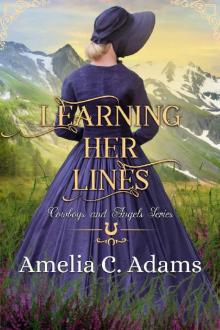 Learning Her Lines
Learning Her Lines Connections
Connections The Turn of a Wheel (Kansas Crossroads Book 17)
The Turn of a Wheel (Kansas Crossroads Book 17) Just Desserts (Main Street Merchants Book 4)
Just Desserts (Main Street Merchants Book 4) An Agent for Anna
An Agent for Anna An Agent for Esme
An Agent for Esme A Handyman for Helen
A Handyman for Helen Scented Sensibility
Scented Sensibility Addie's Adventurer
Addie's Adventurer Defying the Darkness
Defying the Darkness Riding the Rails
Riding the Rails Sugar And Spice (Main Street Merchants Book 7)
Sugar And Spice (Main Street Merchants Book 7) An Agent for Cynthia
An Agent for Cynthia In The Stars (Main Street Merchants Book 6)
In The Stars (Main Street Merchants Book 6) Moonlight With Alice (The Matchmaker's Ball Book 3)
Moonlight With Alice (The Matchmaker's Ball Book 3) Five Golden Rings (Main Street Merchants Book 3)
Five Golden Rings (Main Street Merchants Book 3) Between The Lines (Main Street Merchants Book 5)
Between The Lines (Main Street Merchants Book 5) An Agent for Lucy
An Agent for Lucy Jessica (Seven Sisters Book 2)
Jessica (Seven Sisters Book 2) A Passing Glance
A Passing Glance Pet Peeves
Pet Peeves RNWMP: Bride for Joel
RNWMP: Bride for Joel Bowing to Betsy (The Matchmaker's Ball Book 11)
Bowing to Betsy (The Matchmaker's Ball Book 11) Rebekah (Seven Sisters Book 4)
Rebekah (Seven Sisters Book 4) A Joyful Noise (Kansas Crossroads Book 14)
A Joyful Noise (Kansas Crossroads Book 14) Her Second Chance Hometown Groom
Her Second Chance Hometown Groom A Christmas Promise (Kansas Crossroads Book 16)
A Christmas Promise (Kansas Crossroads Book 16) Bride for Samuel
Bride for Samuel Bribing the Blacksmith (Cowboys and Angels Book 9)
Bribing the Blacksmith (Cowboys and Angels Book 9) RNWMP: Bride for Samuel (Mail Order Mounties Book 12)
RNWMP: Bride for Samuel (Mail Order Mounties Book 12) Tea for Two
Tea for Two The Bitter and the Sweet (Kansas Crossroads Book 9)
The Bitter and the Sweet (Kansas Crossroads Book 9) Frank (Seven Sons Book 6)
Frank (Seven Sons Book 6) A Cattleman for Cora
A Cattleman for Cora Paislee's Path (River's End Ranch Book 48)
Paislee's Path (River's End Ranch Book 48) Accidental Agent (River's End Ranch Book 3)
Accidental Agent (River's End Ranch Book 3) Test of Time (Nurses of New York Book 5)
Test of Time (Nurses of New York Book 5) RNWMP: Bride for Michael (Mail Order Mounties Book 24)
RNWMP: Bride for Michael (Mail Order Mounties Book 24) Loving the Landlord
Loving the Landlord The Dark and the Dawn (Kansas Crossroads Book 3)
The Dark and the Dawn (Kansas Crossroads Book 3) Candy Crush
Candy Crush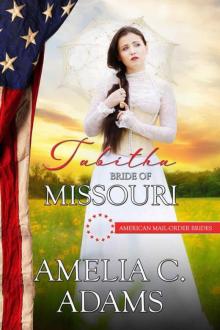 Tabitha: Bride of Missouri (American Mail-Order Bride 24)
Tabitha: Bride of Missouri (American Mail-Order Bride 24) Touch of Tenderness (Nurses of New York Book 3)
Touch of Tenderness (Nurses of New York Book 3) Lucky Lifeguard (River's End Ranch Book 28)
Lucky Lifeguard (River's End Ranch Book 28) Heartstrings (Brody Hotel Book 2)
Heartstrings (Brody Hotel Book 2) Heart of Hearts (Nurses of New York Book 4)
Heart of Hearts (Nurses of New York Book 4) Hope_Bride of New Jersey
Hope_Bride of New Jersey A Careless Wind (Kansas Crossroads Book 7)
A Careless Wind (Kansas Crossroads Book 7) An Agent for Emily (The Pinkerton Matchmaker Book 28)
An Agent for Emily (The Pinkerton Matchmaker Book 28) A Twisted Fate
A Twisted Fate Delivering Destiny (River's End Ranch Book 23)
Delivering Destiny (River's End Ranch Book 23)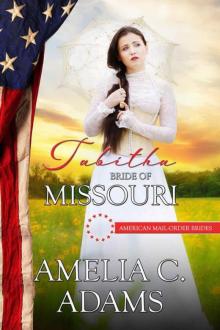 Tabitha_Bride of Missouri
Tabitha_Bride of Missouri A Wrangler for Wynonna
A Wrangler for Wynonna RNWMP_Bride for Peter
RNWMP_Bride for Peter An Unspoken Dream (Kansas Crossroads Book 13)
An Unspoken Dream (Kansas Crossroads Book 13) Generations
Generations Utah Sunrise (Rocky Mountain Romances Book 1)
Utah Sunrise (Rocky Mountain Romances Book 1) Bride for Jonathan
Bride for Jonathan Bribing the Blacksmith
Bribing the Blacksmith A Clean Slate (Kansas Crossroads Book 4)
A Clean Slate (Kansas Crossroads Book 4) Hope: Bride of New Jersey (American Mail-Order Brides 3)
Hope: Bride of New Jersey (American Mail-Order Brides 3) Rugged Rockclimber (River's End Ranch Book 8)
Rugged Rockclimber (River's End Ranch Book 8) RNWMP_Bride for Michael
RNWMP_Bride for Michael RNWMP: Bride for Joel (Mail Order Mounties Book 4)
RNWMP: Bride for Joel (Mail Order Mounties Book 4) Tea For Two (Cowboys & Angels Book 15)
Tea For Two (Cowboys & Angels Book 15) Sweet Georgia Peach
Sweet Georgia Peach RNWMP: Bride for Peter (Mail Order Mounties Book 20)
RNWMP: Bride for Peter (Mail Order Mounties Book 20) A Clear Hope (Kansas Crossroads Book 5)
A Clear Hope (Kansas Crossroads Book 5) Meredith's Mistake (Grandma's Wedding Quilts Book 4)
Meredith's Mistake (Grandma's Wedding Quilts Book 4) RNWMP_Bride for Samuel
RNWMP_Bride for Samuel The Whisper of Morning (Kansas Crossroads Book 6)
The Whisper of Morning (Kansas Crossroads Book 6) RNWMP: Bride for Jonathan (Mail Order Mounties Book 8)
RNWMP: Bride for Jonathan (Mail Order Mounties Book 8) Santa's Shopkeeper (River's End Ranch Book 18)
Santa's Shopkeeper (River's End Ranch Book 18) A Broken Wing (Kansas Crossroads)
A Broken Wing (Kansas Crossroads)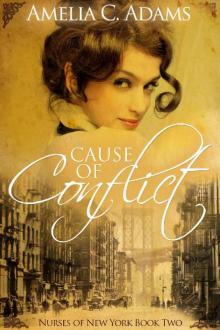 Cause of Conflict (Nurses of New York Book 2)
Cause of Conflict (Nurses of New York Book 2) A Free Heart
A Free Heart A New Beginning
A New Beginning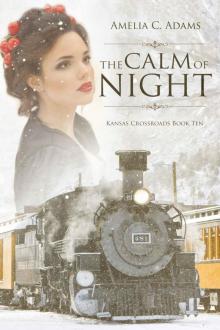 The Calm of Night (Kansas Crossroads Book 10)
The Calm of Night (Kansas Crossroads Book 10) Bride for Calvin
Bride for Calvin Sea of Strangers (Nurses of New York Book 1)
Sea of Strangers (Nurses of New York Book 1)